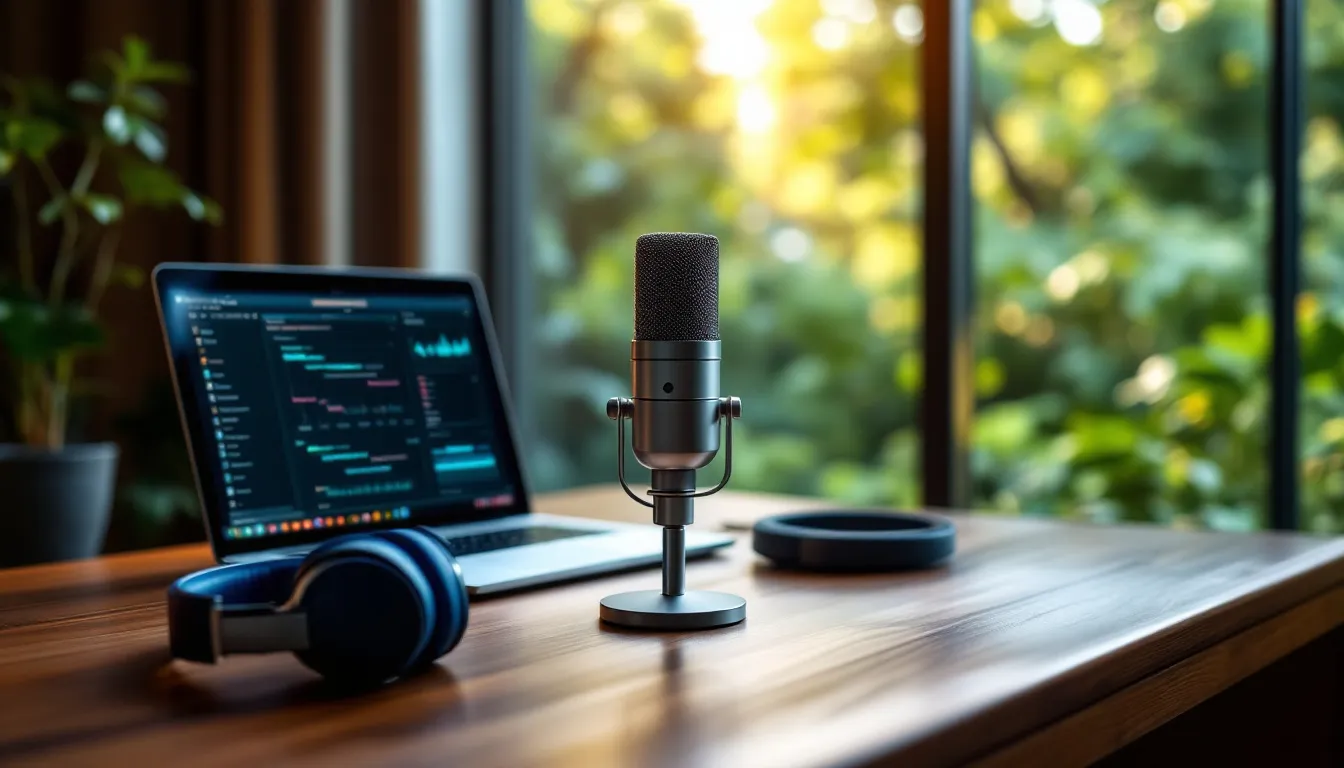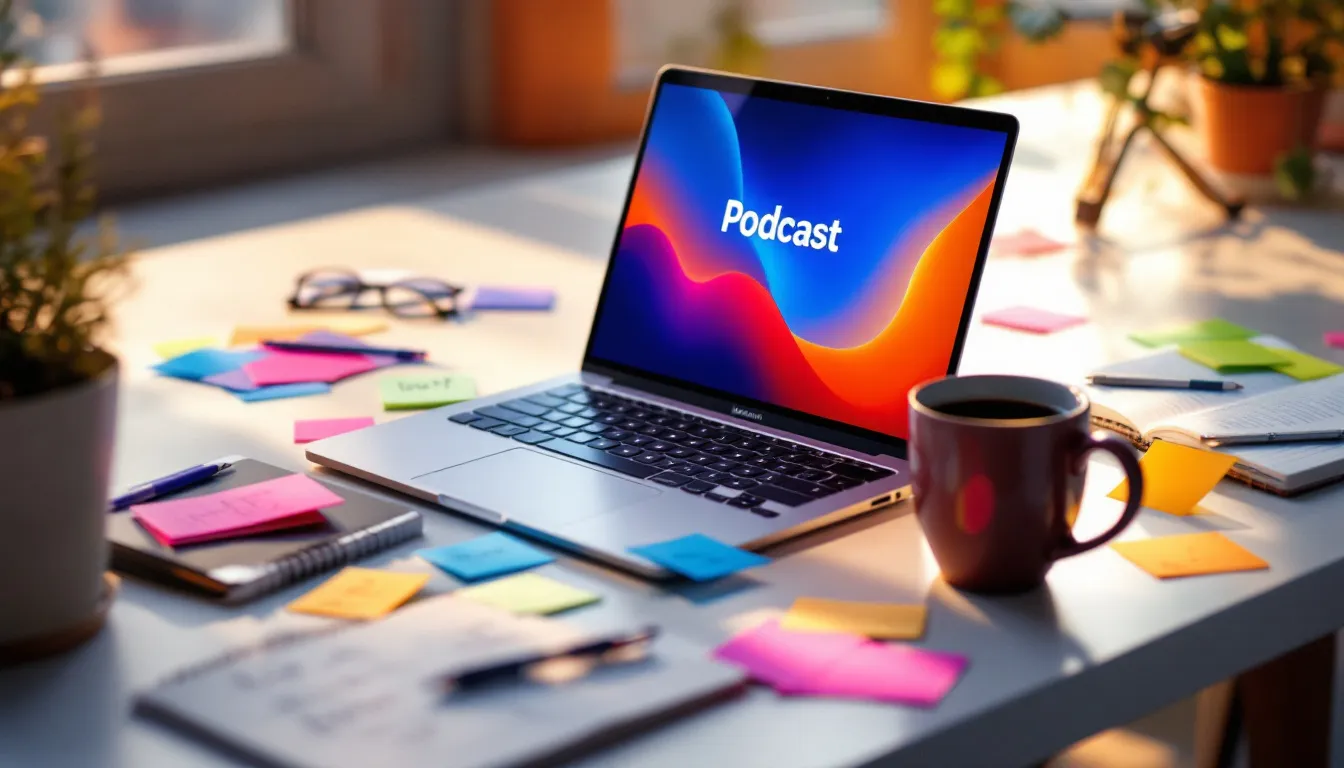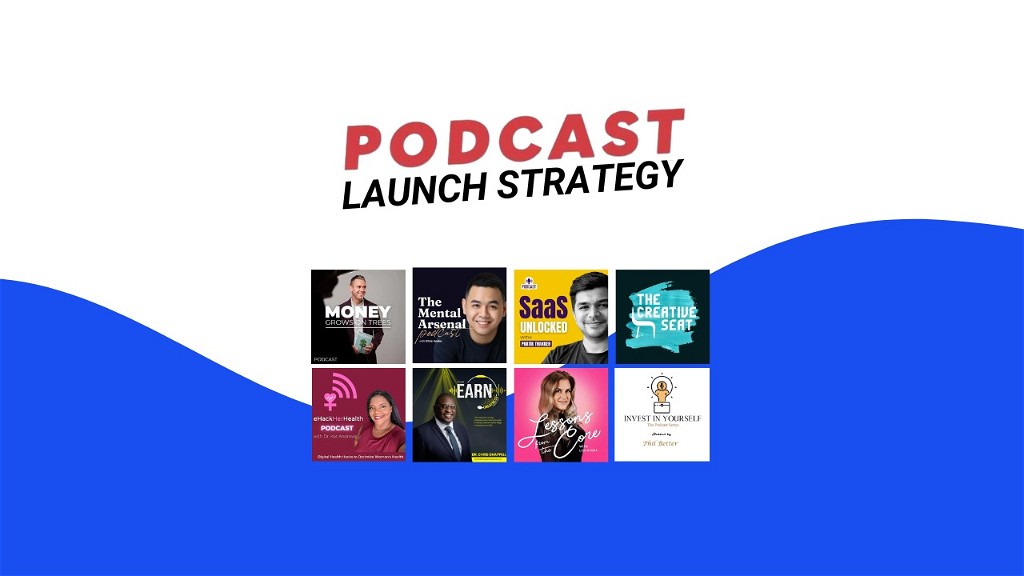Deciding between a solo or co-hosted podcast? Here's what you need to know:
Solo podcasts:
- You're in full control
- Flexible scheduling
- Build your personal brand
- Simpler production
- Risk of burnout
- Limited perspectives
Co-hosted podcasts:
- Dynamic conversations
- Shared workload
- Multiple viewpoints
- Built-in support
- Potential scheduling conflicts
- Creative differences
Quick Comparison:
| Aspect | Solo | Co-hosted |
|---|---|---|
| Control | Full | Shared |
| Scheduling | Flexible | Requires coordination |
| Workload | All on you | Split tasks |
| Content | One perspective | Multiple angles |
| Production | Simpler | More complex |
| Brand building | Personal | Shared |
Choose based on your goals, time, and topic. Both can succeed with the right approach.
Remember: It's not just about the format. Focus on creating value for your listeners, no matter which path you take.
Related video from YouTube
What is a Solo Podcast?
A solo podcast is a one-person show. You're the host, producer, and everything in between. It's just you, your mic, and your listeners.
Solo podcasts work best when you've got:
- Deep knowledge on a topic
- A unique perspective
- Personal stories to share
- Advice to give
- A niche you're passionate about
Take Dr. Will Cole's "The Art of Being Well." As a functional medicine expert, he uses his solo show to share health insights directly with listeners.
Content Types for Solo Hosts
Solo podcasters have plenty of options:
| Content Type | Description | Example |
|---|---|---|
| Monologues | Share your thoughts | "Stassi" by Stassi Schroeder |
| Expert advice | Offer tips | "The Art of Being Well" by Dr. Will Cole |
| Storytelling | Narrate experiences | "Mona-Vated" by Mona Vand |
| News commentary | Discuss current events | "Barely Filtered" by Matt Bellassai |
| Educational | Teach a subject | Various educational podcasts |
With solo podcasting, you're in charge. You decide the content, episode length, and release schedule. It's freeing, but it also means all the work is on you.
"Starting a solo podcast is a fantastic way to get the ball rolling and see if podcasting is something you're actually interested in doing long-term." - Dear Media
Don't think you're limited to talking to yourself. Many solo hosts, like Violet Benson of "Almost Adulting", bring in guests to mix things up.
Starting a solo podcast? Here's what to consider:
- Topic: Choose something you know and love.
- Format: Decide on episode style and length.
- Equipment: Get a good mic ($50-$200) and headphones (about $100).
- Schedule: Set a consistent release schedule.
- Content planning: Brainstorm episode ideas in advance.
Solo podcasting lets you share your voice with the world. Just be ready to put in the work and keep your content engaging.
What is a Co-hosted Podcast?
A co-hosted podcast is when two or three people run the show together. It's like chatting with friends, but with mics and listeners.
Co-hosting spices up podcasting:
- Different voices keep things interesting
- Hosts can split tasks based on what they're good at
- Talks feel more natural, less rehearsed
It's not just about more people talking. It's about creating a vibe that makes listeners feel part of the gang.
Content Types for Co-hosts
Co-hosted shows work great for:
| Format | What It Is | Who Does It Well |
|---|---|---|
| Debates | Hosts argue different sides | "The Infinite Monkey Cage" |
| Interviews | Multiple hosts quiz guests | "The Body Protest" |
| Banter | Casual chats on random stuff | "Dear Hank and John" |
These formats let co-hosts bounce off each other, share different views, and mix personalities.
"Co-hosting has a special place in my heart", says Melissa Guller, host of Wit & Wire.
But it's not all smooth sailing. You need to:
- Be clear about who does what
- Have a co-host agreement to avoid fights
- Sync up schedules
- Play nice with others
When it clicks, co-hosting can make your podcast awesome. It mixes skills, keeps you on your toes, and gives listeners more to enjoy.
The secret sauce? Finding the right partner. Look for someone who:
- Loves the topic as much as you do
- Clicks with you on air
- Brings something new to the table
- Shows up and puts in the work
Get the right co-host and a solid game plan, and you'll create a podcast that's better than what either of you could do alone.
Benefits of Solo Podcasting
Solo podcasting gives you total control and flexibility. Here's why going solo might be your best bet:
Full Control Over Content
As the only host, you're the boss. You choose topics, set the tone, and decide how deep to go. No compromises needed.
"Content freedom is key. One week you're diving deep into a niche topic, the next you're sharing personal stories. It's all up to you."
Flexible Scheduling
Recording solo means no calendar juggling. Got a midnight idea? Start recording. Early riser? Knock out episodes before breakfast.
Pro Tip: Many solo podcasters batch record. You can create a month's worth of content in one go, giving you breathing room between sessions.
Building a Personal Brand
Solo podcasting connects you directly to your audience. Each episode showcases your expertise and personality.
Pat Flynn of "Smart Passive Income" used his solo podcast to become an online business expert. His podcast became the foundation of his personal brand, leading to speaking gigs, books, and a loyal following.
Simpler Production
Solo podcasting means no multiple audio tracks or co-host coordination. This streamlined process often leads to faster publishing.
| Production Step | Solo Podcast | Co-hosted Podcast |
|---|---|---|
| Recording | One person, one schedule | Multiple schedules to align |
| Editing | Single audio track | Multiple tracks to sync |
| Publishing | Quick decisions | Potential back-and-forth |
Solo podcasting isn't just easier—it's often faster too. You can go from idea to published episode with fewer hurdles.
Drawbacks of Solo Podcasting
Solo podcasting isn't all sunshine and rainbows. Let's look at the main challenges you might face:
Risk of Burnout
As a solo podcaster, you're the whole show. Host, producer, editor, marketer - you name it. It's a lot, and it can wear you down fast.
"Recording, editing, and promoting a podcast can be a real grind, especially when you're not seeing immediate results."
To avoid burning out:
- Plan your content ahead
- Batch record episodes
- Get help with editing or marketing
One-sided Viewpoints
When it's just you talking, your listeners only get one perspective. This can make your show feel a bit narrow.
How to fix this:
- Bring in guests now and then
- Ask listeners for their thoughts
- Look into different opinions on your topics
Coming Up with Ideas
Constantly creating new, interesting content is tough when you're the only idea person.
| Problem | Fix |
|---|---|
| Running out of topics | Keep an idea list |
| Limited experiences | Check out what's trending |
| Feeling stuck | Ask your audience what they want |
No Built-in Support
Without a co-host, you're on your own. No one to bounce ideas off or share the work with. It can feel lonely and stressful.
To help with this:
- Join podcasting groups
- Find a podcasting buddy or mentor
- Team up with other solo podcasters for cross-promotion
Benefits of Co-hosted Podcasting
Co-hosting a podcast can be a game-changer. Here's why teaming up might be your best move:
Lively Conversations
Two heads are better than one, especially when it comes to keeping listeners hooked. Co-hosts can:
- Spark dynamic discussions
- Share laughs and banter
- Offer different viewpoints
It's like eavesdropping on friends having a great chat.
"You might really enjoy and benefit from the input of a co-host and your conversations with guests might be livelier, better informed ... funnier even." - Serena Gay, CEO of Made4U Podcasts
Shared Workload
Podcasting isn't just talking into a mic. There's a ton of behind-the-scenes work. With a co-host, you can divide and conquer:
| Task | Who Does It |
|---|---|
| Research | Host A |
| Editing | Host B |
| Social Media | Both |
| Guest Booking | Alternate |
This setup helps you avoid burnout and keeps your show running like a well-oiled machine.
Different Viewpoints
Co-hosts bring their own flavors to the mix:
- Varied life experiences
- Unique skills and knowledge
- Fresh takes on topics
This diversity leads to richer discussions and more well-rounded content for your listeners.
Built-in Support
Podcasting can be tough. Having a partner means you've got:
- A cheerleader when you're feeling down
- A sounding board when you're stuck
- Someone to high-five when you nail it
"When shared, your lows are not as low, and your highs are doubled, making this one of the main benefits of having a co-host on your podcast." - We Edit Podcasts
sbb-itb-cdb7710
Drawbacks of Co-hosted Podcasting
Co-hosting a podcast isn't all sunshine and rainbows. Here are some challenges you might face:
Content Clashes
When two minds meet, it's not always pretty. Co-hosts often disagree on:
- What to talk about
- Who to invite
- How to structure episodes
These creative tussles can slow you down and create friction.
Schedule Struggles
Finding a time that works for everyone? It's a headache. Kane Baron, co-host of The Podcasters Podcast Podcast, says it straight:
"Scheduling can be more difficult with a cohost, both your diaries have to be taken into account, this can be even more of a challenge when interviewing guests."
This juggling act can lead to messy release schedules, rushed recordings, and missed guest opportunities.
Money Matters
As your podcast grows, you'll need to tackle the cash question:
| Issue | What to Ask |
|---|---|
| Revenue Split | Equal? Based on work? |
| Expenses | Who pays what? |
| Financial Plans | Save or spend? |
Without clear agreements, money can turn friends into foes.
Dependence Dilemma
Teamwork is great—until it's not. Co-hosting means:
- Your show needs both hosts to show up
- One no-show can tank an episode
- You're only as good as your weakest link
If your partner flakes or loses steam, your podcast could take a hit.
To dodge these bullets, set clear expectations from day one. Write it down, talk it out, and be ready to meet in the middle. A great co-hosted podcast isn't just about on-air chemistry—it's about off-air harmony too.
Comparison Table
Let's break down solo vs. co-hosted podcasting:
| Aspect | Solo Podcasting | Co-hosted Podcasting |
|---|---|---|
| Content Control | Full control | Shared decision-making |
| Scheduling | Flexible | Requires coordination |
| Workload | All tasks alone | Split responsibilities |
| Audience Engagement | One-on-one feel | Dynamic conversations |
| Idea Generation | Self-reliant | Collaborative |
| Brand Building | Personal brand | Shared podcast identity |
| Production | Simpler setup | More complex |
| Viewpoints | Single perspective | Multiple angles |
| Support System | Self-reliant | Built-in support |
| Financial Aspects | Keep all earnings | Split revenue |
| Risk Factors | Potential burnout | Reliance on others |
Your choice depends on your goals, skills, and resources. Want full control? Go solo. Love collaboration? Co-host.
Both formats can succeed. The Jordan Harbinger Show thrives solo, while My First Million shows how co-hosts can create engaging content together.
Consider:
- Your talking style (alone vs. with others)
- Time commitment
- Topic benefits from multiple voices?
- Long-term podcast goals
Bottom line? Pick the format that lets you create the best content for your audience.
How to Choose Your Format
Picking between solo and co-hosted podcasts isn't simple. Here's what to think about:
Your Podcast Goals
Match your format to your aims:
- Want to build a personal brand? Go solo.
- Looking for dynamic discussions? Try co-hosting.
Time and Resources
Be real about what you can handle:
- Solo podcasting needs more prep but offers flexible scheduling.
- Co-hosting splits the work but requires coordination.
Content and Topic
Some topics work better in different formats:
| Topic Type | Format | Why |
|---|---|---|
| Deep analysis | Solo | Focused exploration |
| Debates | Co-hosted | Multiple viewpoints |
| Storytelling | Solo | Intimate listener connection |
| Interviews | Either | Depends on your style |
Audience Preferences
Know your listeners:
- Ask them what they like.
- Check out what works for your competitors.
Jeremy Enns, CEO of Counterweight Creative, says:
"Your format can (and should) play a big role in that differentiation."
Don't worry - you're not stuck with one format forever. Many podcasters try different styles in their first 20 episodes.
Pick a format that fits your strengths and keeps you excited. Your enthusiasm will come through, whether you're solo or with a co-host.
Tips for Solo Podcasting
Solo podcasting gives you full control, but it's not easy. Here's how to make your show stand out:
Building Your Brand
Your podcast = your personal brand. Make it pop:
- Pick a niche
- Be consistent
- Share your story
Gary Vaynerchuk, VaynerMedia CEO, says:
"I believe that podcasting is grossly undervalued, and I think all of you should start a podcast in the same way that all of you are starting vlogs. Go do it, figure it out. It's even easier, it's your voice."
Making Regular Content
Solo podcasting can be a grind. Stay on track:
- Set a doable schedule
- Batch record episodes
- Use a content calendar
Keeping Listeners Hooked
No co-host? You've got to work harder to engage your audience:
- Use storytelling
- Mix up your format
- Get listeners involved
Debbie Millman, Design Matters host, on consistency:
"I often say that I don't find the time to do things, I make the time to do things."
Remember: Your unique voice is your superpower. Use it.
Tips for Co-hosted Podcasting
Co-hosting a podcast can be fun, but it's not always easy. Here's how to make your show great:
Finding the Right Co-host
Don't just pick your best friend. Look for someone who:
- Loves the topic as much as you do
- Has different skills than you
- Can handle disagreements well
Rob Marsh from The Copywriter Club says:
"A co-host with a different view makes our show more interesting."
Try posting a public call for co-hosts or ask people you know.
Setting Clear Roles
Avoid confusion. Decide who does what:
- Write down your show goals
- List each person's jobs
- Figure out how to handle money and ownership
Ashley Hamer from Taboo Science warns:
"Find someone who's good at what you're not, is responsible, and handles conflict well."
Think about signing an agreement to cover everything.
Working Well Together On-Air
Make your show sound great:
- Plan together using tools like Google Drive
- Chat before you start recording
- Use an outline to stay on track
- Listen and respond to each other
| Tip | Why It Helps |
|---|---|
| Use hand signals | Stop interruptions |
| Set up instant messaging | Talk silently |
| Don't fear disagreements | Makes better conversations |
Remember: Your unique voices make your show special. Let them shine.
Conclusion
Solo or co-hosted podcast? It's not a one-size-fits-all choice. Your decision depends on your goals, resources, and preferences.
Solo podcasting gives you full control. It's great for building a personal brand and offers more flexibility. But watch out for burnout and idea fatigue.
Co-hosted shows bring diverse viewpoints and shared workload. They can be more sustainable long-term. But you'll need to handle potential conflicts and shared responsibilities.
When choosing your format, think about:
- Your podcast goals and audience
- Available time and resources
- Content type and expertise
- Your strengths and weaknesses
Remember: Success isn't just about format. Focus on creating value, engaging your audience, and improving your skills.
The podcast world is always changing. Both solo and co-hosted shows can succeed. Be open to experimenting and adapting as you go.
FAQs
What are the disadvantages of solo podcasts?
Solo podcasts can be tough. Here's why:
- It's all on you to come up with ideas
- You're the only voice, so views can get one-sided
- You might burn out from doing everything yourself
- Keeping listeners hooked without other voices is hard
Should you have a cohost for a podcast?
It depends on what you want. Here's the deal:
Pros of co-hosting:
- You share the work
- You get different viewpoints
- You have built-in support
Cons of co-hosting:
- Schedules might clash
- You might disagree on content
- You have to split the money
Todd Cochran, CEO of Blueberry Podcasting, says:
If you want one, that's great, but you really don't need one.
So, both ways can work. Think about your goals, time, and content type when you decide. Solo or co-hosted, you can make it big if you put in the work.




